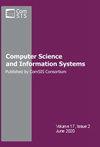FSASA: Sequential recommendation based on fusing session-aware models and self-attention networks
IF 1.2
4区 计算机科学
Q4 COMPUTER SCIENCE, INFORMATION SYSTEMS
引用次数: 0
Abstract
The recommendation system can alleviate the problem of ?information overload?, tap the potential value of data, push personalized information to users in need, and improve information utilization. Sequence recommendation has become a hot research direction because of its practicality and high precision. Deep Neural Networks (DNN) have the natural advantage of capturing comprehensive relations among different entities, thus almost occupying a dominant position in sequence recommendation in the past few years. However, as Deep Learning (DL)-based methods are widely used to model local preferences under user behavior sequences, the global preference modeling of users is often underestimated, and usually, only some simple and crude user latent representations are introduced. Therefore, this paper proposes a sequential recommendation based on Fusing Session-Aware models and Self-Attention networks (FSASA). Specifically, we use the Self-Attentive Sequential Recommendation (SASRec) model as a global representation learning module to capture long-term preferences under user behavior sequences and further propose an improved session-aware sequential recommendation model as a local learning representation module from user model the user?s dynamic preferences in the historical behavior, and finally use the Gated Recurrent Unit (GRU) module to calculate their weights. Experiments on three widely used recommendation atasets show that FSASA outperforms state-of-the-art baselines on two commonly used metrics.FSASA:基于会话感知模型和自关注网络融合的顺序推荐
推荐系统可以缓解信息过载的问题。,挖掘数据潜在价值,向有需要的用户推送个性化信息,提高信息利用率。序列推荐因其实用性和精度高而成为研究的热点方向。深度神经网络(Deep Neural Networks, DNN)具有捕获不同实体之间全面关系的天然优势,因此在过去几年序列推荐中几乎占据主导地位。然而,由于基于深度学习的方法被广泛用于用户行为序列下的局部偏好建模,用户的全局偏好建模往往被低估,并且通常只引入一些简单和粗糙的用户潜在表示。因此,本文提出了一种基于会话感知模型和自关注网络(FSASA)融合的顺序推荐方法。具体而言,我们使用自关注顺序推荐(SASRec)模型作为全局表示学习模块来捕获用户行为序列下的长期偏好,并进一步提出改进的会话感知顺序推荐模型作为用户模型的局部学习表示模块。的动态偏好,最后使用门控循环单元(GRU)模块计算它们的权重。在三个广泛使用的推荐数据集上的实验表明,FSASA在两个常用指标上优于最先进的基线。
本文章由计算机程序翻译,如有差异,请以英文原文为准。
求助全文
约1分钟内获得全文
求助全文
来源期刊

Computer Science and Information Systems
COMPUTER SCIENCE, INFORMATION SYSTEMS-COMPUTER SCIENCE, SOFTWARE ENGINEERING
CiteScore
2.30
自引率
21.40%
发文量
76
审稿时长
7.5 months
期刊介绍:
About the journal
Home page
Contact information
Aims and scope
Indexing information
Editorial policies
ComSIS consortium
Journal boards
Managing board
For authors
Information for contributors
Paper submission
Article submission through OJS
Copyright transfer form
Download section
For readers
Forthcoming articles
Current issue
Archive
Subscription
For reviewers
View and review submissions
News
Journal''s Facebook page
Call for special issue
New issue notification
Aims and scope
Computer Science and Information Systems (ComSIS) is an international refereed journal, published in Serbia. The objective of ComSIS is to communicate important research and development results in the areas of computer science, software engineering, and information systems.
 求助内容:
求助内容: 应助结果提醒方式:
应助结果提醒方式:


